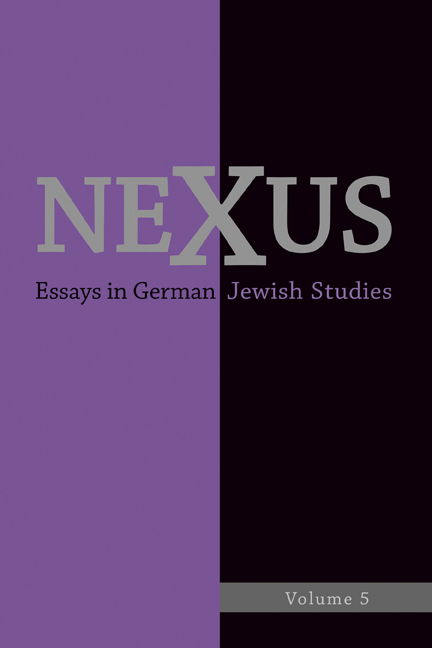 Nexus: Essays in German Jewish Studies, Volume 5
Nexus: Essays in German Jewish Studies, Volume 5 Published online by Cambridge University Press: 24 March 2021
Introduction: Theater and the Possibility of Enlightenment
KARL EMIL FRANZOS'S Der Pojaz (The Clown, 1905) tells the story of a supposedly toxic culture and the emancipatory potential of the theater. The novel is a failed Bildungsroman of sorts or, as Kata Gellen has described it, a failure-to-launch narrative. It may seem an odd starting point for a chapter concerned largely with the German Democratic Republic (GDR), but the novel and its reception tell us a great deal about the place of German culture, and particularly theater, in the German Jewish imagination in the late nineteenth century. Understanding this conceptualization and its evolution throughout the early twentieth century is key to understanding the place of Jewish theater in the East German imagination in the decades following the Holocaust. Looking at East German publications and performances with this particular intellectual and cultural history in mind, it becomes possible to understand the status of Eastern European Jewish culture in the GDR as inherently linked to the state-promoted image of the nation as the already realized besseres Deutschland and the shift away from theater as a means of enlightenment or self-improvement toward its function as a sign that this desired state has already, somehow, been achieved, or is at least well within reach. Crucially, this desired state of being is no longer a goal for Jewish culture but one that is to be reached through the instrumentalization of a particular vision of this culture, a vision that strategically excised the elements of Jewishness deemed antithetical to proletarian universalism and highlighted those that could be used to support East Germany's own selfmythologization as the only antifascist German state.
Der Pojaz describes Sender Glatteis and his journey out of, and back to, the shtetl as he struggles to become an actor on the German-language stage. Franzos sets up the German language and culture as the path to enlightenment and modernity—only to have his protagonist die in the place of his birth after pursuing this very path. It is not that Franzos's narrative undermines the possibility of enlightenment through German culture; the novel in fact depicts a real-world example of exactly the kind of success Sender is striving toward in the form of Bogumil Dawison, the most successful Jewish actor in nineteenth-century Europe.
To save this book to your Kindle, first ensure [email protected] is added to your Approved Personal Document E-mail List under your Personal Document Settings on the Manage Your Content and Devices page of your Amazon account. Then enter the ‘name’ part of your Kindle email address below. Find out more about saving to your Kindle.
Note you can select to save to either the @free.kindle.com or @kindle.com variations. ‘@free.kindle.com’ emails are free but can only be saved to your device when it is connected to wi-fi. ‘@kindle.com’ emails can be delivered even when you are not connected to wi-fi, but note that service fees apply.
Find out more about the Kindle Personal Document Service.
To save content items to your account, please confirm that you agree to abide by our usage policies. If this is the first time you use this feature, you will be asked to authorise Cambridge Core to connect with your account. Find out more about saving content to Dropbox.
To save content items to your account, please confirm that you agree to abide by our usage policies. If this is the first time you use this feature, you will be asked to authorise Cambridge Core to connect with your account. Find out more about saving content to Google Drive.